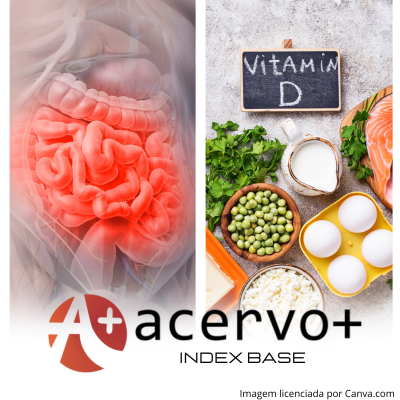Influência da microbiota intestinal e vitamina D sobre a depressão
##plugins.themes.bootstrap3.article.main##
Resumo
Objetivo: Analisar os principais artigos científicos da literatura médica sobre a influência da microbiota intestinal e vitamina D sobre a depressão. Métodos: Revisão integrativa da literatura por meio de buscas, nos últimos 5 anos (2019 – 2024), realizadas nas bases de dados: Scielo, PubMed, Literatura Latino-Americana e do Caribe (LILACS) e MEDLINE indexadas na Biblioteca Virtual em Saúde (BVS). Foram utilizados os seguintes operadores booleanos: “microbiota intestinal” AND “depressão”, “vitamina D” AND “depressão” e “microbiota intestinal” AND “vitamina D”. Resultados: A amostra final foi de 26 artigos, todos encontrados na plataforma PubMed; 13 artigos abordaram sobre microbiota intestinal e depressão, 8 artigos sobre microbiota intestinal e vitamina D e 5 artigos sobre vitamina D e depressão. Considerações finais: As pesquisas analisadas destacaram a complexa relação entre microbiota intestinal e vitamina D na depressão. A compreensão dos mecanismos existentes nessa relação oferece novas estratégias para o tratamento desse transtorno debilitante além dos sintomas emocionais.
##plugins.themes.bootstrap3.article.details##
Copyright © | Todos os direitos reservados.
A revista detém os direitos autorais exclusivos de publicação deste artigo nos termos da lei 9610/98.
Reprodução parcial
É livre o uso de partes do texto, figuras e questionário do artigo, sendo obrigatória a citação dos autores e revista.
Reprodução total
É expressamente proibida, devendo ser autorizada pela revista.
Referências
2. AKIMBEKOV I, et al. Vitamin D and the Host-Gut Microbiome: A Brief Overview, Acta Histochemica et Cytochemica, 2020; 53(3): 33–42.
3. BEUREL E, et al. The Bidirectional Relationship of Depression and Inflammation: Double Trouble. Neuron, 2020; 107(2): 234–56.
4. BELLERBA F, et al. The Association between Vitamin D and Gut Microbiota: A Systematic Review of Human Studies. Nutrients, 2021; 13(10): 3378.
5. CAI Y, et al. Gut-brain axis in depression: Crosstalk between neuroinflammation and gut microbiota. Advanced Neurology, 2023;1(3): 272.
6. CANTORNA MT, et al. Vitamin A and vitamin D regulate the microbial complexity, barrier function and the mucosal immune responses to insure intestinal homeostasis. Critical reviews in biochemistry and molecular biology, 2019; 54(2): 184–192.
7. CHATTERJEE I, et al. Vitamin D Receptor Promotes Healthy Microbial Metabolites and Microbiome. Scientific Reports, 2020; 10(1): 7340.
8. CROLL PH, et al. Associations of Vitamin D Deficiency with MRI Markers of Brain Health in a Community Sample, Clinical Nutrition, 2021; 40(1): 72–78.
9. CRUZ-PEREIRA JS, et al. Depression’s Unholy Trinity: Dysregulated Stress, Immunity, and the Microbiome. Annual Review of Psychology, 2020; 71(1): 49–78.
10. DUDEK KA, et al. Neurobiology of Resilience in Depression: Immune and Vascular Insights from Human and Animal Studies. The European Journal of Neuroscience, 2021; 53(1): 183–221.
11. GENG C, et al. Vitamin D and Depression: Mechanisms, Determination and Application, Asia Pacific Journal of Clinical Nutrition, 2019; 28(4): 689–694.
12. GÓRALCZYK-BIŃKOWSKA A, et al. The Microbiota-Gut-Brain Axis in Psychiatric Disorders. International Journal of Molecular Sciences, 2022; 23(19): 11245.
13. KOUBA BR, et al. Molecular Basis Underlying the Therapeutic Potential of Vitamin D for the Treatment of Depression and Anxiety. International Journal of Molecular Sciences, 2022; 23(13): 7077.
14. MADAN A, et al. The Gut Microbiota Is Associated with Psychiatric Symptom Severity and Treatment Outcome among Individuals with Serious Mental Illness. Journal of Affective Disorders, 2020; 264: 98–106.
15. MAYNE PE e BURNE TH. Vitamin D in Synaptic Plasticity, Cognitive Function, and Neuropsychiatric Illness. Trends in Neurosciences, 2019; 42(4): 293–306.
16. MCGUINNESS AJ, et al. A Systematic Review of Gut Microbiota Composition in Observational Studies of Major Depressive Disorder, Bipolar Disorder and Schizophrenia. Molecular Psychiatry, 2022; 27(4): 1920–1935.
17. MUSAZADEH V, et al. Vitamin D Protects against Depression: Evidence from an Umbrella Meta-Analysis on Interventional and Observational Meta-Analyses. Pharmacological Research, 2023; 187: 106605.
18. OTAKA M, et al. Effect of Lacticaseibacillus paracasei Strain Shirota on Improvement in Depressive Symptoms, and Its Association with Abundance of Actinobacteria in Gut Microbiota. Microorganisms, 2021; 9(5): 1026.
19. PORTO CM, et al. Contribuições da vitamina D no tratamento de sintomas depressivos e fatores de risco cardiovascular: protocolo de estudo para um ensaio clínico randomizado, duplo-cego e controlado por placebo. Trials, 2019; 20: 583.
20. RUTSCH A, et al. The Gut-Brain Axis: How Microbiota and Host Inflammasome Influence Brain Physiology and Pathology. Frontiers in Immunology, 2020; 11: 604179.
21. SANADA K, et al. Gut Microbiota and Major Depressive Disorder: A Systematic Review and Meta-Analysis. Journal of Affective Disorders, 2020; 266: 1–13.
22. SHIEH A, et al. Pilot Trial of Vitamin D3 and Calcifediol in Healthy Vitamin D Deficient Adults: Does It Change the Fecal Microbiome? Journal of Clinical Endocrinology and Metabolic, 2021; 106(12): 3464–76.
23. SINGH P, et al. The Potential Role of Vitamin D Supplementation as a Gut Microbiota Modifier in Healthy Individuals. Scientific Reports, 2020; 10(1): 21641.
24. SMITH DG, et al. Identification and characterization of a novel anti-inflammatory lipid isolated from Mycobacterium vaccae, a soil-derived bacterium with immunoregulatory and stress resilience properties. Psychopharmacology, 2019; 236(5): 1653–70.
25. TANELIAN A, et al. Microbial composition, functionality, and stress resilience or susceptibility: unraveling sex-specific patterns. Biology of Sex Differences, 2024; 15(1): 20.
26. TANGESTANI H, et al. Vitamin D and The Gut Microbiota: A Narrative Literature Review. Clinical Nutrition Research, 2021; 10(3): 181–191.

